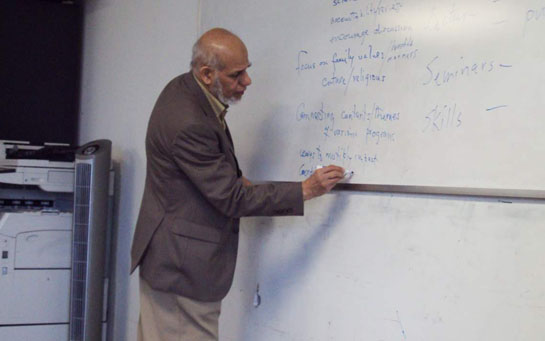ADAMS Center Forming Education Oversight Committee to Integrate Common Themes Across All Programs Education and Beyond

A meeting was held on Saturday Jan. 12, from 10 a.m. – 12p.m. in the ADAMS Center Youth room in hopes to appoint an Education Oversight Committee to oversee all educational programs and activities conducted by ADAMS. Their main goal is to introduce a common and integrated theme across education at all levels.
The purpose of the meeting was to seek input from community members especially those with academic experience. Iqbal Unus, one of the Board of Trustees members at ADAMS, moderated the session with approximately eight other community members present.
Education has been a huge part of ADAMS Center’s mission since the very beginning. There are various educational programs at ADAMS that cater to adults, youth and children.
As for adults, education is implemented through different facets like khutbahs. In addition, the Qurtaba Institute, which is based in ADAMS, offers certificates and occasional lectures. On a regular basis, lectures are given from local scholars as well as visiting scholars like Shaykh Hamza Yusuf. Additionally, seminars that focus on specific issues like domestic violence are also included as well as skill trainings on IT, parenting and interfaith events.
During the meeting, one of the issues discussed was that Muslim adults in the community are having difficulty in differentiating culture from religion. Azra Hasan, one of the members participating in the discussion and a social worker who deals with Muslim families, explained that there are many immigrant women in the Muslim community who are not educated enough, moreover stressing the need for educational programs targeting adults. Hasan has encountered many Muslim families who are struggling with divorce and suggested that there should be more educational programs for adults that encourage family values.
The youth, on the other hand, have separate programs from the adults and children. There is the Young Muslims Evening School (YMES), an after-school program for 10-17 year- olds to learn Islamic Studies, Qur’an, and to also engage in activities like sports and games. Other programs include the Youth Education Program (YEP) which is also known as Saturday school, youth groups, clubs, camps and the Taleem ul Quran program.
Sajjad Ahmad, who was formerly involved with YEP and has background in education, mentioned that the purpose should be to supplement public education with Islamic knowledge and to ask ourselves “how does Islam impact current issues.” For example, he indicated how Muslim youth aren’t going to learn about the 1,001 inventions exhibit at the National Geographic in D.C. from their history classes in public schools.
Most of the people present agreed that the public education system in America has an impact, which can be perceived as negative at times, based on how children build their character, and how they are raised within the system. Uzma Rasheed, who was also involved with Saturday School and continues to work with the youth, added that books, T.V., magazines and media as a whole plays a major role in impacting the youth and everyone in general.
Hasan, who is also a mother of three children, two of which are in elementary school, said, “we knew we were coming to a western country and our goal was to make the best of what we had.”
Luckily, there are programs for children at ADAMS to gain Islamic knowledge. Sunday School (CEP) is open for children who are between ages four to twelve. Quran school, Girl scouts, Boy scouts, and Cub scouts are also active programs. Moreover, Radiant Hearts Academy is a day school at ADAMS available to Pre K and up to second grade homeschoolers.
The Education Oversight Committee is in the process of forming. Eventually, whoever is chosen to be on the committee would have to report to the Board of Trustees and develop a mission statement/policy which all educational programs at ADAMS would adhere to.
Therefore, the meeting’s goal was to establish a central purpose for education at ADAMS. Unus proposed a question to the attendees, “we are spending money and time on these educational programs, what is it that we are trying to achieve?”
Hasan said, “I think the main purpose should be to build character to survive in institutions like the family.”
Rasheed added, “It should be to encourage youth and adults to learn as a characteristic of themselves.”
Overall, the collective response was that the central purpose of education at ADAMS should include building character, encouraging positive behavioral change, promoting productive citizenship and to learn about Islamic history and origins.
During the meeting, Unus expressed a deep concern that only 30% of the Muslims in the ADAMS area are coming to the Mosque. With a strong education program and coordination, this very well may increase the number of attendees.
Therefore, more discussions and meetings will occur to finalize the committee.
“I think most mosques are realizing the need for a central point, goal and foundation to foster education,” said Hasan.
The mission now for the proposed committee is to unite all educational programs under a theme and purpose to further improve the system and make it more efficient and beneficial to all. As Ahmad said, “we need to keep planting the seed, watering it, and in due time, it will grow.”









Comments powered by CComment